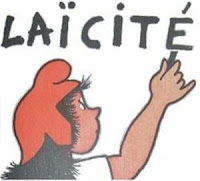For a more tolerant laïcité.
 As a follow-up on the post on French laïcité, I would like to add something to an interesting comment on the article mentioned on our blog earlier :
As a follow-up on the post on French laïcité, I would like to add something to an interesting comment on the article mentioned on our blog earlier :… laïcité is a complete and real separation of Church and State (not a fake one like in the US) where religion is confined to the private sphere (also remember that the separation between public and private is clear cut in France). In other words it's not about allowing every religion to express themselves and oppressing non religious people, but about religious people keeping their faith to themselves and not showing it off constantly in other people's faces
First, to our non-French readers not familiar with French concepts, you must understand that the word laïcité is a notion that does not quite translate in English. It goes beyond "secularism" and is encroached in the French cultural and historical context, hence the complexity. (the word itself comes from the Greek and means "of layman" and is also sometimes translated, although rarely, by 'laicity' or 'laicism' in English).
I find the comment here above somewhat illuminating of what a lot of French (mostly non religious) people may think. French laïcité is indeed very strict but it is so at the expense of personal freedom, freedom of expression and in some ways freedom of religion.
In France, public religious expression is often feared to be the first step towards oppression against the Republic by non-religious people, no matter how fantasized that may be. And of course, this fear has been reinforced in the last decades by the demands of some Muslims for more religious expression. The argument for the defense of laïcité often hides a deeper fear of ‘the other’ religion which is Islam especially in its more extreme form. This in return has led to a more restrictive interpretation of the term “laïcité” in the last few years
A good illustration of this is the law banning ostentatious religious symbols in schools. (see our post here) This law was passed in 2003 after a few Muslim girls came to school wearing headscarves. This law was a departure from traditional laïcité which had been, since the Jules Ferry laws, about schools, and teachers, not about students, and indeed for many years school administrators had accepted that schoolchildren wear symbols of their various religions, such as a Christian student wearing a cross, or a Jewish boy wearing a kippah.
Interestingly however, a lot of Muslims who grew up learning French values and French history have integrated the idea of a secular state and seem to agree with it. It is also worth noticing that the riots in France in 2005 were in no way religious. There was absolutely no demand for a repeal of the ‘headscarf’ law for instance. In fact there was no demand at all. It was mostly an (improvised) expression of frustration, anger and boredom borne out of miserable living conditions. If anything, it showed that the youths in those impoverished neighborhoods want to be more like the rest of the French, not less. They do not want to be a separate (religious or not) community and have no special demand other than becoming mainstream.
Nonetheless, I believe French laïcitéé needs to be more respectful of the freedom of religion and expression. Thus I think that France’s laïcité should be inclusive and not exclusive. Laïcité should only be about “the absence of religious involvement in government affairs and the absence of government involvement in religious affairs”, and that’s all. It should just guarantee the neutrality of the state. Other than when people work for the state or are elected officials - in which case they should keep their religious beliefs private – people in France should be able to express themselves however they want in the public sphere, including religiously. After all, religious freedom is guaranteed by the French Constitution.
Besides, there are many breaches in the ideal French laïcité that many laïques do not recognize : as mentioned in the article, school (and public) holidays follow the Christian liturgical year, and the French government highly subsidizes private schools affiliated with religious organizations. So why not recognize the need for change?
Too often in France, laïcité has become a disguise for anti-clericalism, and more recently for Islamophobia. I
 would even argue that it has even become a religion of its own.
would even argue that it has even become a religion of its own.Anti-clericalism may have been part of the founding myth of the republican idea, just like religious freedom is an important part of the American founding myth (which explains why religion plays such a dominant role in U.S. public affairs) but is time for both our countries to take perspective and depart from their respective myths. The French and the Americans have been caught in their own paradigm based on historical myths. It is time to see the world as it is now, not as it was in the 18th and 19th centuries. It is time to move on. It is time to re-invent ourselves.














